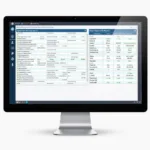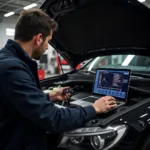Car diagnostics is the process of identifying problems in a vehicle using computerized tools and techniques. As car technology rapidly evolves, learning car diagnostics has become increasingly important for both car enthusiasts and professionals in the automotive industry.
Why Learn Car Diagnostics?
Understanding car diagnostics empowers you to:
- Save money on repairs: Diagnose car problems yourself and potentially avoid costly mechanic visits.
- Carry out DIY repairs: With the right knowledge, you can fix many car issues independently.
- Make informed decisions: Understand the severity of a problem and negotiate fair repair costs.
- Enhance your career prospects: Develop valuable skills in a high-demand field within the automotive industry.
How to Learn Car Diagnostics
There are numerous avenues to acquire car diagnostic skills:
- Online Courses: Enroll in structured online courses like the car diagnostics learning course to learn at your own pace from industry experts.
- Hands-On Experience: Nothing beats practical experience. Work on your own car, volunteer to assist a mechanic friend, or participate in workshops to apply your knowledge.
- Books and Manuals: Consult comprehensive car repair manuals specific to your vehicle’s make and model for detailed information on diagnostic procedures.
- Forums and Communities: Engage with fellow car enthusiasts and professionals online to exchange knowledge, seek advice, and troubleshoot issues.
Essential Car Diagnostic Tools
To effectively diagnose car problems, you’ll need the right tools:
- OBD-II Scanner: A must-have tool that connects to your car’s onboard computer to read and interpret diagnostic trouble codes (DTCs).
- Multimeter: Measures voltage, current, and resistance to test electrical components and circuits.
- Code Reader Apps: Several smartphone apps offer basic code reading capabilities, providing a convenient starting point.
 Mechanic Using OBD Scanner on Vehicle
Mechanic Using OBD Scanner on Vehicle
Understanding Diagnostic Trouble Codes (DTCs)
DTCs are alphanumeric codes that indicate specific areas where the car’s computer system has detected a malfunction. Understanding these codes is crucial for accurate diagnosis. Resources like DiagFixPro provide comprehensive information on DTC meanings and potential causes.
Common Car Diagnostic Mistakes to Avoid
- Jumping to conclusions: Thoroughly investigate all possibilities before assuming a specific component is faulty.
- Ignoring basic checks: Ensure basic maintenance is up-to-date before diving into complex diagnostics.
- Using incorrect tools: Utilizing the wrong tools can lead to inaccurate readings and potentially damage the vehicle’s electronics.
The Future of Car Diagnostics
As technology advances, car diagnostics will become increasingly sophisticated:
- Remote Diagnostics: Diagnose car problems remotely using telematics and cloud-based systems.
- Predictive Diagnostics: Utilize artificial intelligence and machine learning to anticipate potential issues before they arise.
- Increased Connectivity: Expect seamless integration between vehicles, diagnostic tools, and repair networks.
Conclusion
Learning car diagnostics is an empowering skill in today’s automotive landscape. Whether you’re a DIY enthusiast or a seasoned professional, staying abreast of diagnostic techniques and tools is essential. Embrace the knowledge, explore available resources like DiagFixPro, and confidently navigate the world of car diagnostics.
FAQs
1. Can I learn car diagnostics on my own?
Absolutely! Numerous resources like online courses, books, and forums can guide you. Start with the basics and gradually progress to more complex concepts.
2. What is the most important tool for car diagnostics?
The OBD-II scanner is indispensable, as it provides access to the car’s computer and reveals valuable diagnostic information.
3. Are there affordable car diagnostic tools available?
Yes, several budget-friendly code readers and basic multimeters are available, making it easier to get started with car diagnostics.
4. Is it safe to work on car diagnostics myself?
While basic diagnostics are generally safe, always prioritize safety precautions. Disconnect the battery when working on electrical components and consult reliable resources.
5. How often should I perform car diagnostics?
It’s recommended to run a diagnostic scan at least annually or whenever you experience unusual car behavior.
6. Can car diagnostics help me improve fuel efficiency?
Yes, identifying and addressing issues related to sensors, emissions, and engine performance can positively impact fuel economy.
7. What are some advanced car diagnostic techniques?
Advanced techniques involve oscilloscope measurements, network analysis, and programming/coding of control modules, often requiring specialized tools and expertise.
Do you have other questions about car diagnostics?
Check out our other helpful articles on DiagFixPro, including:
- Diagnostic Model Cars
- Hack into a Diagnostic Box for a Car
- Bluetooth Car Fault Code Reader Engine Scanner Diagnostic Reset Tool
- Car Diagnostic Specialists
Need personalized support? Contact our 24/7 customer service team via WhatsApp: +1(641)206-8880 or email us at [email protected]. We’re here to help!

